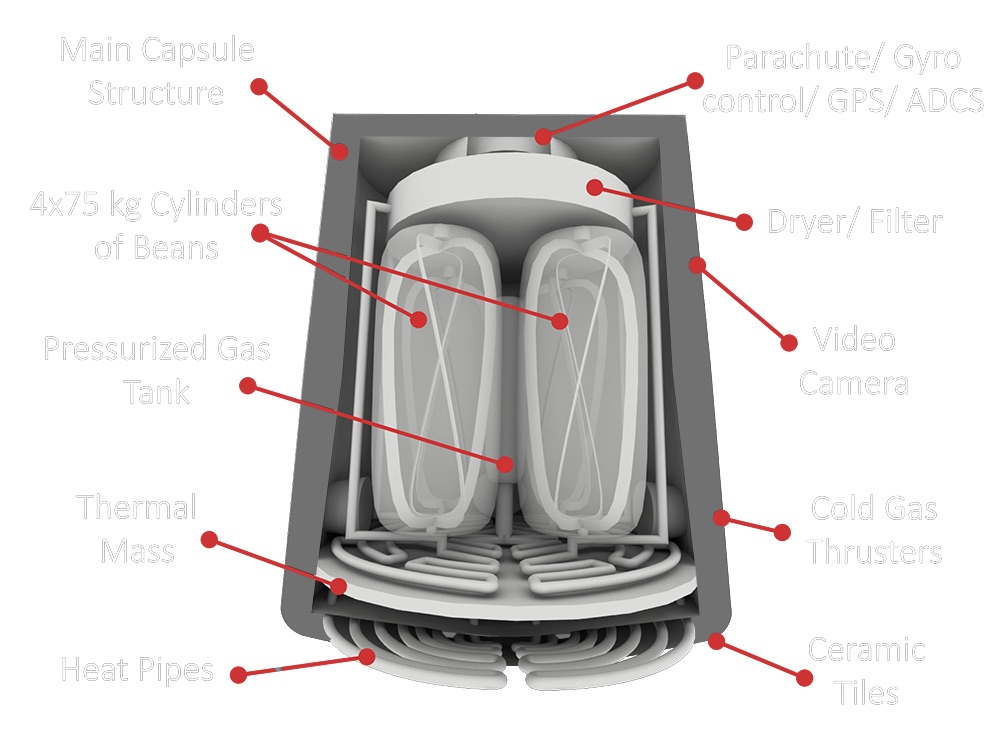Coffee Lovers May Someday Brew Their Java with Space-Roasted Beans
There's gourmet coffee, and then there's coffee roasted by the searing heat of re-entry into Earth's atmosphere from the edge of space.
The latter is the goal of the company Space Roasters, whose plan calls for a special bean-roasting capsule to fall from about 110-125 miles (180-200 kilometers) above Earth's surface.
"We believe the idea of taking a seemingly ordinary Earth-based activity of roasting coffee beans and demonstrating the use of space technology to achieve a better product will stimulate the general population to think outside the box," Coffee Roasters' founders, Anders Cavallini and Hatem Alkhafaji, told Room Magazine. (A copy of the article is available on the Space Roasters website.) "It will also encourage others to realize that space is not just for satellites — but for just about anything the mind can ponder." [To Boldly Brew: Astronaut Uses ISSpresso to Make 1st Cup of Coffee in Space]
The founders told Room that traditional coffee is roasted in a spinning, heated drum, where beans contact the sides of the container and heat unevenly. To get a uniform roast, the beans have to be cooked for longer.
Many manufacturing processes in space can take advantage of microgravity to keep material evenly mixed and avoid the effects at the edges of containers, and Coffee Roasters' plan is to make use of that situation to evenly roast their beans by distributing the heat from re-entry — caused by friction between the fast-moving capsule and particles in Earth's atmosphere — among four gas- and bean-filled chambers.
Space.com asked company representatives by email when exactly the capsule experiences microgravity, since objects experience a slowing drag during re-entry, and got the following response: "We will achieve roasting in microgravity in two stages. First, a suborbital flight to prove the concept and gather data from the roast. Second, with our Space Roasting Capsule (SRC) at orbital speeds, there will be a low angle of re-entry which will minimize accelerations, but still achieving a microgravity environment."

According to Room Magazine, the capsule could be about 350 cubic feet (10 cubic meters) to encompass the roasters and other components, and weigh about 1,100 lbs. (500 kg) on Earth. By adapting the attachment, it could work with different rockets — though the founders are "in discussion with a handful of providers, including Rocket Lab and Blue Origin," there is no set plan. They added that their goal is to space-roast coffee beans by 2020 and serve them first in Dubai before expanding internationally.
Get the Space.com Newsletter
Breaking space news, the latest updates on rocket launches, skywatching events and more!
Though the founders don't propose a price for the coffee, Eric Berger in Ars Technica calculates based on the mass and proposed trajectory that with launch costs alone this coffee could cost about $200 per cup. With the cost of design, development and the capsule itself, the per-cup cost after the beans are recovered from land or sea could reach $500.
Email Sarah Lewin at slewin@space.com or follow her @SarahExplains. Follow us on Twitter @Spacedotcom and on Facebook. Original article on Space.com.
Join our Space Forums to keep talking space on the latest missions, night sky and more! And if you have a news tip, correction or comment, let us know at: community@space.com.

Sarah Lewin started writing for Space.com in June of 2015 as a Staff Writer and became Associate Editor in 2019 . Her work has been featured by Scientific American, IEEE Spectrum, Quanta Magazine, Wired, The Scientist, Science Friday and WGBH's Inside NOVA. Sarah has an MA from NYU's Science, Health and Environmental Reporting Program and an AB in mathematics from Brown University. When not writing, reading or thinking about space, Sarah enjoys musical theatre and mathematical papercraft. She is currently Assistant News Editor at Scientific American. You can follow her on Twitter @SarahExplains.









